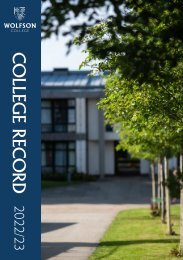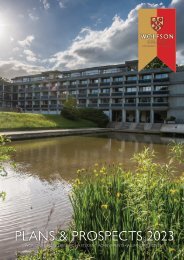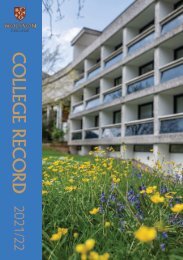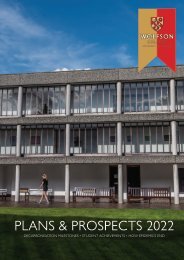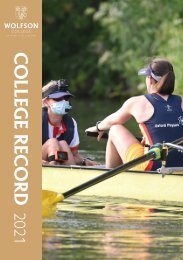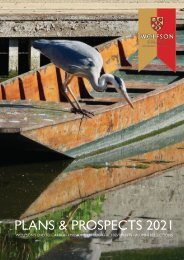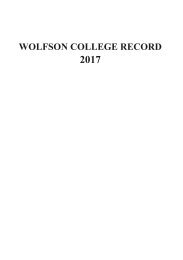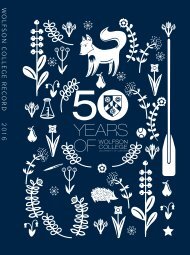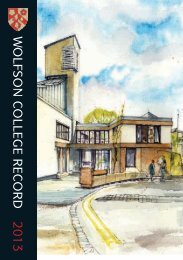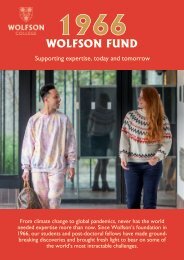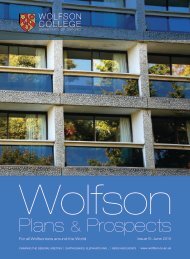Create successful ePaper yourself
Turn your PDF publications into a flip-book with our unique Google optimized e-Paper software.
MEMORIES OF WOLFSON<br />
for short periods by a succession of his<br />
friends and acquaintances. As Hans wrote<br />
to the SPSL in April 1940: ‘I have managed<br />
to find some hospitality between March<br />
and Christmas 1939, but altogether I had to<br />
move more than twenty times from place<br />
to place.’ That works out to moving about<br />
once a fortnight. Willy was more fortunate.<br />
Through his pen-friend Donald Baron he<br />
was given residency in Pusey House, Oxford,<br />
for the two months of Trinity Term.<br />
By the time the war broke out, on 3<br />
September 1939, Willy and Hans were back<br />
together and made strenuous efforts to<br />
contact their parents, with a view to finding<br />
a way to get them out. Surprisingly, despite<br />
the war, a letter dated 14 September got<br />
through to them from Ferdinand saying: ‘My<br />
dearest children, we got your messages and<br />
we are very happy to hear that you both<br />
are well and live together. We had to take<br />
a new flat of two rooms and kitchen. It is<br />
a very nice flat with modern comfort.’ For<br />
all Ferdinand’s upbeat manner, it was clearly<br />
a step down in the world. Their spacious<br />
apartment in the centre of town had been<br />
commandeered by the Germans, and their<br />
small new flat in the suburbs was rented in<br />
Lissy’s name, so that it would not be taken<br />
away from them because of Ferdinand’s<br />
Jewish origins.<br />
In late December 1939, Hans finally made<br />
it to the Hastings Chess Congress. It was a<br />
mere shadow of its former self with only<br />
eight players, seven of whom were British,<br />
so Hans single-handedly made it into an<br />
International Congress.<br />
1940 was a better year for Hans. He<br />
decided to take another doctorate, this<br />
time a DPhil at Oxford. He contacted the<br />
Postgraduate Aid Committee, chaired by the<br />
Master of Balliol, and renewed his requests<br />
for help from the SPSL.<br />
108<br />
A letter from Ronald Bell, Fellow and Tutor<br />
in Chemistry at Balliol, who was secretary<br />
of the Postgraduate Aid Committee, to<br />
Miss Simpson, the secretary of SPSL, makes<br />
it clear why Hans’s case was particularly<br />
difficult. ‘Though young,’ he writes of Hans,<br />
‘he is considerably more experienced than<br />
most of the people with whom we have to<br />
deal, and it seems to me that he rather lies<br />
in the No Man’s Land between the SPSL and<br />
this committee. At this end I have managed<br />
to persuade Exeter <strong>College</strong> to admit him<br />
with remission of all fees, and this would also<br />
exempt him from any University dues. On<br />
the other hand, we are not able to make any<br />
direct financial grant to him for maintenance.’<br />
Hans’s own letters to Miss Simpson give<br />
interesting insights into his precarious<br />
financial situation. In April 1940, he writes<br />
that he has ‘found a room with full board<br />
and everything included for 27 shillings a<br />
week.’ Eventually, the SPSL agreed to fund<br />
him at a rate of £100 a year, but only for<br />
three months at a time pending a further<br />
application, so his money worries continued.<br />
He matriculated as a graduate student<br />
at Exeter <strong>College</strong> on 4 May 1940 and<br />
soon afterwards received his first monthly<br />
payment from SPSL of £8 6s 8d. His<br />
supervisor was G. D. H. Cole, then at Univ.<br />
Hans first proposed a broad subject for his<br />
thesis, building on his work in international<br />
law and political science: a comparison of<br />
attempts at international co-operation from<br />
the Concert of Europe up to and including<br />
the League of Nations. In the manner of<br />
DPhil supervisors, Cole urged Hans to<br />
focus more narrowly, suggesting the earlier<br />
period. As a result, Hans’s transition from<br />
international lawyer to historian came about<br />
more by chance than by conscious choice.<br />
By 1942, Hans had begun to earn some<br />
money, lecturing twice a week in Exeter<br />
<strong>College</strong> on European Economic History<br />
1815–48. In Michaelmas Term, he began<br />
to give tutorials to students in LMH and<br />
COLLEGE RECORD <strong>2019</strong>



